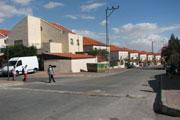International community must act against Israeli settlements
15 December 2009 – A United Nations committee on Palestinian rights today called on the international community “to take urgent and decisive action against the continued illegal Israeli actions,” warning that Israel’s settlement activities in the occupied Palestinian territory risk undermining the whole structure of international law.“Israel’s violation of international law goes far beyond the context of the Israeli-Palestinian conflict and may affect conflict situations in other parts of the world by discrediting, disregarding and seriously undermining the existing international legal system,” the UN Bureau of the Committee on the Exercise of the Inalienable Rights of the Palestinian People said in a statement.
Israel’s temporary suspension of settlement activity falls far short of its obligations under the Road Map – the internationally endorsed plan for a two-State solution to the conflict – requiring it to freeze all settlement activity, including natural growth, and to immediately dismantle settlement outposts erected since March 2001, it added.
The Bureau fully supported the position of the Palestinian leadership that a resumption of political dialogue with Israel would be meaningless due to continued settlement activity, noting that even Israel’s temporary halt in construction had been further undercut by the explicit exclusion of occupied East Jerusalem.
It reiterated that Israel is fully bound by the provisions of international humanitarian law, including the Fourth Geneva Convention, which stipulates that “the Occupying Power shall not deport or transfer parts of its own civilian population into the territory it occupies.”
It called on the parties to the Convention “to take, individually or collectively, the measures they deem appropriate to ensure respect for the Convention,” including by convening a conference to address the issue.
The Bureau also voiced “great concern” at the wave of recent settler-related violent incidents and provocations, citing almost daily reports of attacks against Palestinian civilians. “Settlers have been involved in shooting at Palestinian civilians, damaging their property, vandalizing places of worship, uprooting trees, burning farmland and destroying harvests,” it said. “They intimidate, harass and physically assault Palestinian men, women and children.
“Last week’s burning of a mosque in the village of Yasuf, north-east of Salfit, is just another vivid example of settler crimes. The lack of adequate Israeli law enforcement, bordering on permissiveness, when it comes to settler violence, is fuelling tensions and could lead to another escalation of the conflict.”
In a related development the UN Office for the Coordination of Humanitarian Affairs (OCHA) issued a report today on Israel’s highly restrictive zoning regime in what is known as Area C of the West Bank, which covers 60 per cent of the land, although the overwhelming majority of the Palestinian population resides in Areas A and B.
Area C holds the land reserves necessary for the development of the main population centres and a significant part of the agricultural and grazing land, and because it is the only contiguous territory in the West Bank, it is critical for the implementation of any large-scale infrastructure projects.
But, OCHA said, Palestinian construction is effectively prohibited in some 70 per cent of Area C, while in the remaining 30 per cent, a range of restrictions virtually eliminates the possibility of obtaining a building permit.
As a result of this restrictive planning regime, tens of thousands of Palestinians wishing to build in most parts of Area C are left with no choice other than to carry out unauthorized construction on their land to meet their housing needs. As a consequence, they risk demolition of their structures and subsequent displacement, OCHA added.

